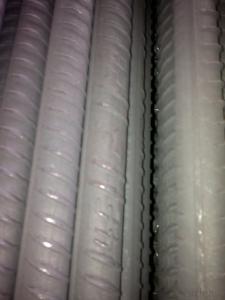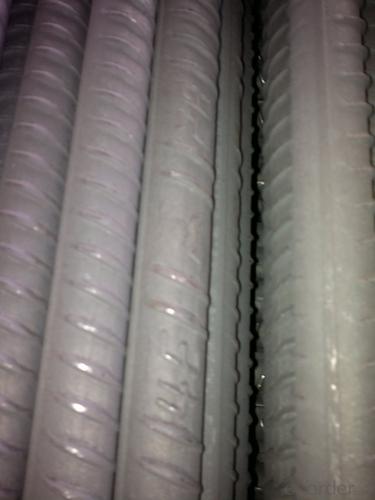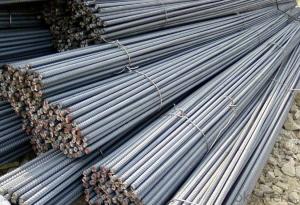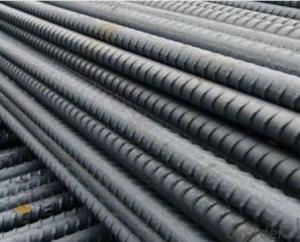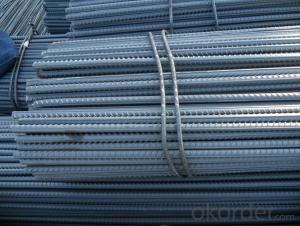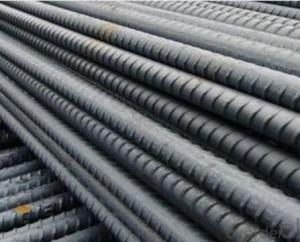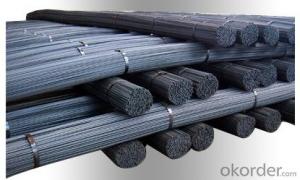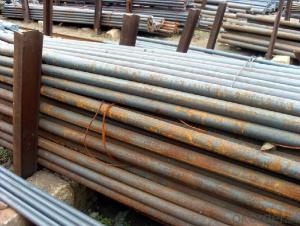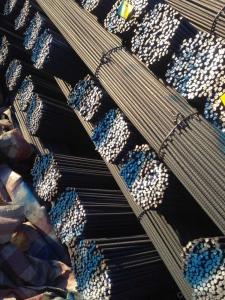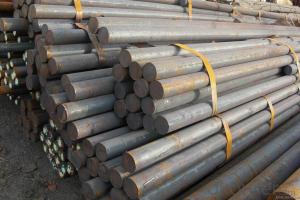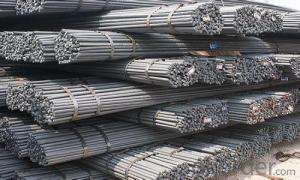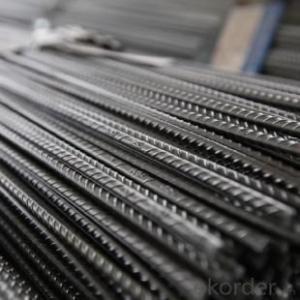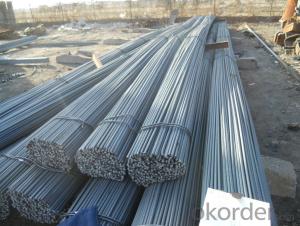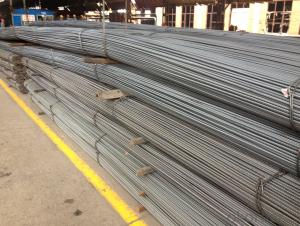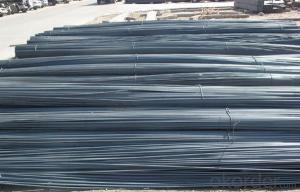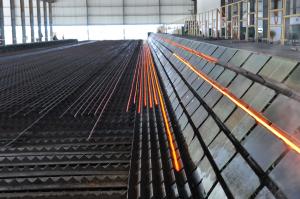GB/UK/USA STANDARD Deformed Steel Bar
- Loading Port:
- China Main Port
- Payment Terms:
- TT or LC
- Min Order Qty:
- -
- Supply Capability:
- -
OKorder Service Pledge
OKorder Financial Service
You Might Also Like
Product Description:
OKorder is offering GB/UK/USA STANDARD Deformed Steel Bar at great prices with worldwide shipping. Our supplier is a world-class manufacturer of steel, with our products utilized the world over. OKorder annually supplies products to European, North American and Asian markets. We provide quotations within 24 hours of receiving an inquiry and guarantee competitive prices.
Product Applications:
GB/UK/USA STANDARD Deformed Steel Bar are ideal for structural applications and are widely used in the construction of buildings and bridges, and the manufacturing, petrochemical, and transportation industries.
Product Advantages:
OKorder's GB/UK/USA STANDARD Deformed Steel Bar are durable, strong, and resist corrosion.
Main Product Features:
· Premium quality
· Prompt delivery & seaworthy packing (30 days after receiving deposit)
· Corrosion resistance
· Can be recycled and reused
· Mill test certification
· Professional Service
· Competitive pricing
Product Specifications:
Specifications of Deformed Steel Bar:
Standard | GB | HRB335, HRB400, HRB500 | |
UK | G460B, B500A, B500B,B500C | ||
USA | GR40, GR60 | ||
Diameter | 6mm,8mm,10mm,12mm,14mm,16mm,18mm,20mm, 22mm,25mm,28mm,32mm,36mm,40mm,50mm | ||
Length | 6M, 9M,12M or as required | ||
Place of origin | China mainland | ||
Application | building,construction,road,bridge etc | ||
Brand name | DRAGON | ||
Theoretical weight and section area of each diameter as below for your information:
Diameter(mm) | Section area (mm²) | Mass(kg/m) |
6 | 28.27 | 0.222 |
8 | 50.27 | 0.395 |
10 | 78.54 | 0.617 |
12 | 113.1 | 0.888 |
14 | 153.9 | 1.21 |
16 | 201.1 | 1.58 |
18 | 254.5 | 2.00 |
20 | 314.2 | 2.47 |
22 | 380.1 | 2.98 |
25 | 490.9 | 3.85 |
28 | 615.8 | 4.83 |
32 | 804.2 | 6.31 |
36 | 1018 | 7.99 |
40 | 1257 | 9.87 |
50 | 1964 | 15.42 |
Usage and Applications of Deformed Steel Bar:
Deformed bar is widely used in buildings, bridges, roads and other engineering construction. Big to highways, railways, bridges, culverts, tunnels, public facilities such as flood control, dam, small to housing construction, beam, column, wall and the foundation of the plate, deformed bar is an integral structure material. With the development of world economy and the vigorous development of infrastructure construction, real estate, the demand for deformed bar will be larger and larger..
Packaging & Delivery of Deformed Steel Bar:
Packaging Detail: products are packed in bundle and then shipped by container or bulk vessel, deformed bar is usually naked strapping delivery, when storing, please pay attention to moisture proof. The performance of rust will produce adverse effect.
Each bundle weight: 2-3MT, or as required
Payment term: TT or L/C
Delivery Detail: within 45 days after received advanced payment or LC.
Label: to be specified by customer, generally, each bundle has 1-2 labels
Trade terms: FOB, CFR, CIF
Deformed Steel Bar in Coil
Produce Line of Deformed Steel Bar
Note:
1. Our products are produced according to national standard (GB), if not, supply according to national standards (GB) or agreement as customer required.
2. Other Grade and Standard Deformed Steel Bar we can supply:
Grade: GR40/GR60, G460B/B500A/B500B/B500C,BST500S
Standard: ASTM, BS, DIN
The Minimum Order Quantity of these products is high, and need to be confirmed.
3. We can not only supply Deformed Steel Bar; if you need anything about building materials, please contact us for further information.
4. Please send us your detail specifications when inquire. We will reply to you as soon as possible. We sincerely hope we can establish a long stable business relationship
FAQ:
Q1: Why buy Materials & Equipment from OKorder.com?
A1: All products offered byOKorder.com are carefully selected from China's most reliable manufacturing enterprises. Through its ISO certifications, OKorder.com adheres to the highest standards and a commitment to supply chain safety and customer satisfaction.
Q2: How do we guarantee the quality of our products?
A2: We have established an advanced quality management system which conducts strict quality tests at every step, from raw materials to the final product. At the same time, we provide extensive follow-up service assurances as required.
Q3: How soon can we receive the product after purchase?
A3: Within three days of placing an order, we will begin production. The specific shipping date is dependent upon international and government factors, but is typically 7 to 10 workdays.
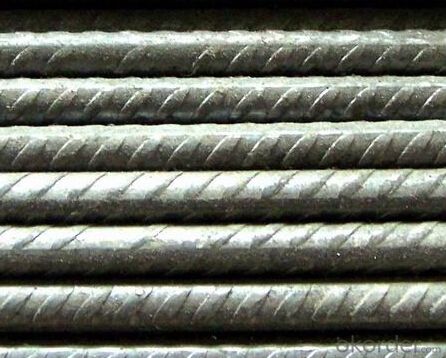
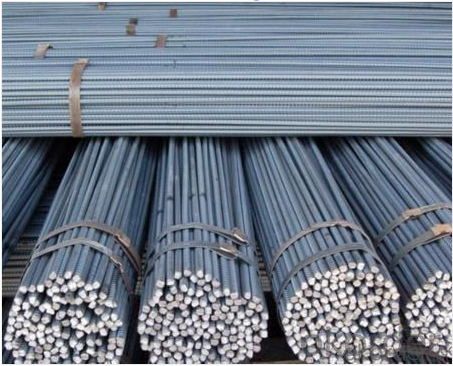
- Q: Are steel rebars suitable for use in earthquake-resistant structures?
- Yes, steel rebars are suitable for use in earthquake-resistant structures. Steel rebars are strong, durable, and have excellent tensile strength, making them an ideal material for reinforcing concrete in earthquake-prone areas. They help to enhance the structural integrity of buildings and provide resistance against seismic forces, reducing the risk of collapse during an earthquake.
- Q: How are steel rebars used in parking structures?
- Steel rebars are used in parking structures to reinforce and strengthen the concrete, increasing its load-bearing capacity and durability. They are typically placed in the concrete to resist tension and prevent cracking, ensuring the structure's stability and longevity.
- Q: Can steel rebars be replaced with other reinforcement materials?
- Yes, steel rebars can be replaced with other reinforcement materials such as fiberglass, carbon fiber, or composite bars. These alternative materials offer advantages like higher tensile strength, corrosion resistance, and lighter weight. However, the choice of replacement material depends on the specific requirements of the construction project and should be evaluated carefully to ensure structural integrity and compliance with relevant codes and standards.
- Q: Can steel rebars be used in structures with limited construction timeframes?
- Structures with limited construction timeframes can indeed utilize steel rebars. These rebars are frequently employed in construction projects due to their remarkable tensile strength, making them ideal for reinforcing concrete structures. Speedy and efficient installation is achievable with steel rebars, enabling faster construction compared to alternative reinforcement materials. Moreover, steel rebars offer durability and long-term stability, guaranteeing the integrity of the structure, even in time-constrained projects. Hence, employing steel rebars proves to be an effective solution for structures with limited construction timeframes, as they deliver both strength and swiftness in the construction process.
- Q: Can steel rebars be used in slabs and beams?
- Yes, steel rebars can be used in slabs and beams. Steel rebars are commonly used as reinforcement in concrete structures, including slabs and beams, to enhance their strength and durability.
- Q: Can steel rebars be used in soundproof structures?
- Steel rebars can be used in soundproof structures, but they are not the sole component responsible for soundproofing. Steel rebars are primarily used for reinforcement in concrete structures, such as walls or floors. While they can help in reducing sound transmission to some extent, additional soundproofing materials and techniques are necessary to achieve effective soundproofing. To create a soundproof structure, several factors need to be considered. One important factor is the mass of the structure. Steel rebars, being heavy and dense, contribute to increasing the mass of the structure, which helps in reducing sound transmission. However, the effectiveness of soundproofing also depends on the overall design, construction techniques, and the incorporation of other sound-absorbing materials. To enhance the soundproofing capabilities of a structure, other materials can be added, such as acoustic insulation, soundproofing panels, or resilient channels. Acoustic insulation materials, such as mineral wool or acoustic foam, can be installed within the walls or floors to absorb sound waves and prevent them from traveling through the structure. Soundproofing panels can also be added to surfaces to reflect or absorb sound waves, further reducing noise transmission. Moreover, proper construction techniques should be employed to ensure that there are no gaps or air leaks that could allow sound to pass through. Using resilient channels, which isolate the structure from the surrounding surfaces, can also help in reducing sound transmission. In conclusion, while steel rebars can contribute to soundproofing a structure by increasing its mass, they alone are not sufficient to create a completely soundproof environment. Effective soundproofing requires a combination of design, construction techniques, and the incorporation of additional sound-absorbing materials to achieve the desired level of sound reduction.
- Q: Can steel rebars be used in structures with high levels of chloride or sulfate attack?
- It is not recommended to use steel rebars in structures that are prone to high levels of chloride or sulfate attack. When chloride ions infiltrate the concrete and interact with the steel, corrosion occurs, which can result in the deterioration of the rebars and compromise the overall structural integrity of the building. Similarly, sulfate attack occurs when sulfate ions react with the components of the concrete, leading to the formation of expansive compounds that cause cracking and deterioration. In order to prevent these types of attacks, it is advisable to employ alternative materials like stainless steel rebars or corrosion-resistant alloys in structures that are exposed to significant amounts of chloride or sulfate. These materials possess a higher resistance to corrosion and are better equipped to endure the aggressive chemical environment. Furthermore, employing proper design and construction techniques, such as ensuring sufficient concrete cover and utilizing protective coatings, can also aid in mitigating the effects of chloride or sulfate attack. It is crucial to seek advice from structural engineers or corrosion specialists to determine the optimal approach for each specific project.
- Q: How are steel rebars tested for quality assurance?
- Steel rebars are tested for quality assurance through various methods such as visual inspection, dimensional checks, and mechanical tests. Visual inspection involves examining the surface for any visible defects or irregularities. Dimensional checks ensure that the rebar meets the required size and shape specifications. Mechanical tests assess the strength, elasticity, and ductility of the rebars, including tensile and bending tests. These quality assurance tests help ensure that the steel rebars meet the necessary standards and are fit for their intended use in construction projects.
- Q: Can steel rebars be used in structures with limited construction expertise?
- No, steel rebars should not be used in structures with limited construction expertise. The correct installation and placement of rebars require specialized knowledge and skills to ensure the structural integrity and safety of the building. Using rebars incorrectly could result in a compromised structure and potential hazards. It is essential to consult professionals with expertise in construction to handle the installation of rebars properly.
- Q: Can steel rebars be used in tunnel lining construction?
- Yes, steel rebars can be used in tunnel lining construction. In fact, steel rebars are commonly used in tunnel lining because of their high tensile strength and durability. They provide structural reinforcement to the concrete lining, ensuring its stability and long-term performance. The rebars are typically embedded within the concrete lining, forming a strong composite structure that can withstand the loads and pressures experienced in tunnel environments. Additionally, steel rebars can be easily shaped and bent to follow the contour of the tunnel, allowing for efficient and precise construction. Overall, steel rebars are an essential component in tunnel lining construction, providing the necessary strength and structural integrity to ensure the safety and longevity of the tunnels.
Send your message to us
GB/UK/USA STANDARD Deformed Steel Bar
- Loading Port:
- China Main Port
- Payment Terms:
- TT or LC
- Min Order Qty:
- -
- Supply Capability:
- -
OKorder Service Pledge
OKorder Financial Service
Similar products
Hot products
Hot Searches
Related keywords
